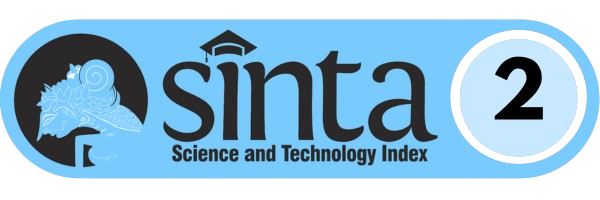Antecedents of Improving Service Performance Innovation in Food and Beverage Start Up Businesses
DOI:
https://doi.org/10.24269/ekuilibrium.v20i2.2025.pp259-270Keywords:
Service innovation performance, Thriving at work, Leader member exchange, Coworker support, Path analysisAbstract
Service innovation is currently a challenge for every business, including start-up food and beverage businesses in Yogyakarta. This study aims to test the importance of service performance innovation by considering positive Thriving at work behavior as a mediator, with antecedents of Leader Member Exchange (LMX) and co-worker support. The approach used in the study is a quantitative approach. The study was conducted by taking a Food and beverage startup business, a Cafe service in the Yogyakarta area. Using Path Analysis and Sobel test, the results show the influence of LMX on Thriving at work, the influence of co-worker support on thriving at work, and the influence of co-worker support on service performance innovation. The results of this study provide implications for the importance of building a model for improving business service performance innovation through positive thriving at work behavior and organizational processes, namely leader member exchange and co-worker support, especially in the context of the food and beverage business.
Downloads
References
Baeriswyl, S., Krause, A., Elfering, A., & Berset, M. (2017). How workload and coworker
support relate to emotional exhaustion: The mediating role of sickness presenteeism. International Journal of Stress Management, 24(1), 52–73
Bhatti, M. A., Khan, N. R., Hussain, S., & Ghaleb, M. M. S. (2022). LMX, thriving at work and creative performance: Mediating effect of knowledge hiding. Social Space, 22(3), 196-225.
Blau, P. M. (1964). Justice in social exchange. Sociological Inquiry, 34, 193–206
Choi, J. N. (2007). Change-oriented organizational citizenship behavior: Effects of work environment characteristics and intervening psychological processes. Journal of Organizational Behavior, 28, 467–485
Cobb, S. (1976). Social support as a moderator of life stress. Psychosomatic Medicine, 38, 300–314.
Cropanzano, R., & Mitchell, M. S. (2005). Social exchange theory: An interdisciplinary review. Journal of Management, 31(6), 874–900.
Dhar, R. L. (2016). Ethical leadership and its impact on service innovative behavior: The role of LMX and job autonomy. Tourism Management, 57, 139-148.
Garg, S., & Dhar, R. (2017). Employee service innovative behavior: The roles of leader-member exchange (LMX), work engagement, and job autonomy. International Journal of Manpower, 38(2), 242-258.
Goodwin, R., Costa, P., & Adonu, J. (2004). Social support and its consequences: ‘‘Positive’’ and ‘‘deficiency’’ values and their implications for support and self- esteem. British Journal of Social Psychology, 43, 465–474
Guchait, P., Pas¸amehmeto˘glu, A., & Madera, J. (2016). Error management culture: Impact on cohesion, stress, and turnover intentions. Service Industries Journal, 36 (3–4), 124–141.
House, J. S. (1981). Work stress and social support. Reading, MA: Addison-Wesley.
Hu, M. L., Horng, J. S., & Sun, Y. H. C. (2009). Hospitality teams: Knowledge sharing and service innovation performance. Tourism Management, 30(1), 41–50.
Hoang, G., Luu, T. T., Nguyen, T. T., Du, T., & Le, L. P. (2022). Examining the effect of entrepreneurial leadership on employees’ innovative behavior in SME hotels: A mediated moderation model. International Journal of Hospitality Management, 102, Article 103142.
Kim, H., Im, J., & Shin, Y. H. (2023). Relational resources for promoting restaurant employees’ thriving at work. International Journal of Contemporary Hospitality Management.
Ladd, D., & Henry, R. A. (2000). Helping coworkers and helping the organization: The role of support perceptions, exchange ideology, and conscientiousness. Journal of Applied Social Psychology, 30, 2028–2049.
Li, J. (2015). The mediating roles of job crafting and thriving in the LMX-employee outcomes relationship. Japanese Journal of Administrative Science, 28(1), 39-51.
Li, Y., Lin, C., Wu, T., & Jin, M. (2016). Influences of leader-member exchange on employees' service innovation behaviors. Revista Ibérica de Sistemas e Tecnologias de Informação, (E11), 356.
Liden, R. C., & Maslyn, J. M. (1998). Multidimensionality of leader–member exchange: An empirical assessment through scale development. Journal of Management, 24(1), 43–72.
Luthans, F., Norman, S. M., Avolio, B. J., & Avey, J. B. (2008). The mediating role of psychological capital in the supportive organizational climate: Employee performance relationship. Journal of Organizational Behavior, 29(2), 219–238
Niessen, C., Sonnentag, S., & Sach, F. (2012). Thriving at work—a diary study. Journal of Organizational Behavior, 33(4), 468–487
Milia Di, L., & Jiang, Z. (2022). Linking leader-member exchange and work–nonwork balance: the mediating role of thriving at work and the moderating role of gender. Personnel Review.
Niessen, C., Sonnentag, S., & Sach, F. (2012). Thriving at work—A diary study. Journal of Organizational Behavior, 33(4), 468-487.
Porath, C. L., Spreitzer, G. M., Gibson, C., & Garnett, F. G. (2012). Thriving at work: Toward its measurement, construct validation, and theoretical refinement. Journal of Organizational Behavior, 33, 250–27.
Ryan, R. M., & Deci, E. L. (2000). Self-determination theory and the facilitation of intrinsic motivation, social development, and well-being. American Psychologist, 55 (1), 68–78
Shraga, O., & Shirom, A. (2009). The construct validity of vigor and its antecedents: A qualitative study. Human Relations, 62, 271–291.
Shulga, L. V. (2021). Front-line employee self-determination in value co-creation: Generational profiles. Journal of Hospitality and Tourism Management, 48, 479–491
Walumbwa, F. O., Muchiri, M. K., Misati, E., Wu, C., & Meiliani, M. (2018). Inspired to perform: A multilevel investigation of antecedents and consequences of thriving at work. Journal of Organizational Behavior, 39(3), 249-261.
Wu Chi-Min a, Tso-Jen Chen b,*, Yao-Chin Wang. 2023. Formation of hotel employees’ service innovation performance: Mechanism of thriving at work and change-oriented organizational citizenship behavior, Journal of Hospitality and Tourism Management 54 (2023) 178–187
Zhai, Q., Wang, S., & Weadon, H. (2020). Thriving at work as a mediator of the relationship between workplace support and life satisfaction. Journal of Management & Organization, 26(2), 168-184.
Zhang Liu, D. Wang, Y., & Yan, Y. (2021). The antecedents of thriving at work: a meta-analytic review. Frontiers in psychology, 12, 659072.
Downloads
Published
How to Cite
Issue
Section
License

This work is licensed under a Creative Commons Attribution-ShareAlike 4.0 International License.
Retained Rights/Terms and Conditions of Publication
1. As an author you (or your employer or institution) may do the following:
- make copies (print or electronic) of the article for your own personal use, including for your own classroom teaching use;
- make copies and distribute such copies (including through e-mail) of the article to research colleagues, for the personal use by such colleagues (but not commercially or systematically, e.g. via an e-mail list or list server);
- present the article at a meeting or conference and to distribute copies of the article to the delegates attending such meeting;
- for your employer, if the article is a ‘work for hire’, made within the scope of your employment, your employer may use all or part of the information in the article for other intra-company use (e.g. training);
- retain patent and trademark rights and rights to any process, procedure, or article of manufacture described in the article;
- include the article in full or in part in a thesis or dissertation (provided that this is not to be published commercially);
- use the article or any part thereof in a printed compilation of your works, such as collected writings or lecture notes (subsequent to publication of the article in the journal); and prepare other derivative works, to extend the article into book-length form, or to otherwise re-use portions or excerpts in other works, with full acknowledgement of its original publication in the journal;
- may reproduce or authorize others to reproduce the article, material extracted from the article, or derivative works for the author's personal use or for company use, provided that the source and the copyright notice are indicated, the copies are not used in any way that implies RCEPM-LIPI endorsement of a product or service of any employer, and the copies themselves are not offered for sale.
All copies, print or electronic, or other use of the paper or article must include the appropriate bibliographic citation for the article's publication in the journal.
2. Requests from third parties
Although authors are permitted to re-use all or portions of the article in other works, this does not include granting third-party requests for reprinting, republishing, or other types of re-use. Requests for all uses not included above, including the authorization of third parties to reproduce or otherwise use all or part of the article.
3. Author Online Use
- Personal Servers. Authors and/or their employers shall have the right to post the accepted version of articles pre-print version of the article, or revised personal version of the final text of the article (to reflect changes made in the peer review and editing process) on their own personal servers or the servers of their institutions or employers without permission from Universitas Muhamamdiyah Ponorogo, provided that the posted version includes a prominently displayed Universitas Muhamamdiyah Ponorogo copyright notice and, when published, a full citation to the original publication, including a link to the article abstract in the journal homepage. Authors shall not post the final, published versions of their papers;
- Classroom or Internal Training Use. An author is expressly permitted to post any portion of the accepted version of his/her own articles on the author's personal web site or the servers of the author's institution or company in connection with the author's teaching, training, or work responsibilities, provided that the appropriate copyright, credit, and reuse notices appear prominently with the posted material. Examples of permitted uses are lecture materials, course packs, e-reserves, conference presentations, or in-house training courses;
- Electronic Preprints. Before submitting an article to an Ekuilibrium: Jurnal Ilmiah Bidang Ilmu Ekonomi, authors frequently post their manuscripts to their own web site, their employer's site, or to another server that invites constructive comment from colleagues. Upon submission of an article to Ekuilibrium: Jurnal Ilmiah Bidang Ilmu Ekonomi, an author is required to transfer copyright in the article to Economy Faculty Universitas Muhammadiyah Ponorogo, and the author must update any previously posted version of the article with a prominently displayed Economy Faculty Universitas Muhammadiyah Ponorogo copyright notice. Upon publication of an article by the Universitas Muhammadiyah Ponorogo, the author must replace any previously posted electronic versions of the article with either (1) the full citation to the work with a Digital Object Identifier (DOI) or link to the article abstract in Ekuilibrium: Jurnal Ilmiah Bidang Ilmu Ekonomi journal homepage, or (2) the accepted version only (not the final, published version), including the Economy Faculty Universitas Muhammadiyah Ponorogo copyright notice and full citation, with a link to the final, published article in journal homepage.
4. Articles in Press (AiP) service
Economy Faculty Universitas Muhammadiyah Ponorogo may choose to publish an abstract or portions of the paper before we publish it in the journal. Please contact our Production department immediately if you do not want us to make any such prior publication for any reason, including disclosure of a patentable invention.
5. Author/Employer Rights
If you are employed and prepared the article on a subject within the scope of your employment, the copyright in the article belongs to your employer as a work-for-hire. In that case, Economy Faculty Universitas Muhammadiyah Ponorogo assumes that when you sign this Form, you are authorized to do so by your employer and that your employer has consented to the transfer of copyright, to the representation and warranty of publication rights, and to all other terms and conditions of this Form. If such authorization and consent has not been given to you, an authorized representative of your employer should sign this Form as the Author.
6. RCEPM-LIPI Copyright Ownership
It is the formal policy of Economy Faculty Universitas Muhammadiyah Ponorogo to own the copyrights to all copyrightable material in its technical publications and to the individual contributions contained therein, in order to protect the interests of the Economy Faculty Universitas Muhammadiyah Ponorogo, its authors and their employers, and, at the same time, to facilitate the appropriate re-use of this material by others. Economy Faculty Universitas Muhammadiyah Ponorogo distributes its technical publications throughout the world and does so by various means such as hard copy, microfiche, microfilm, and electronic media. It also abstracts and may translate its publications, and articles contained therein, for inclusion in various compendiums, collective works, databases and similar publication.
7. Licensing Terms
Ekuilibrium is licensed under a Creative Commons Attribution-ShareAlike 4.0 International License.
Permissions beyond the scope of this license may be available at https://journal.umpo.ac.id/











